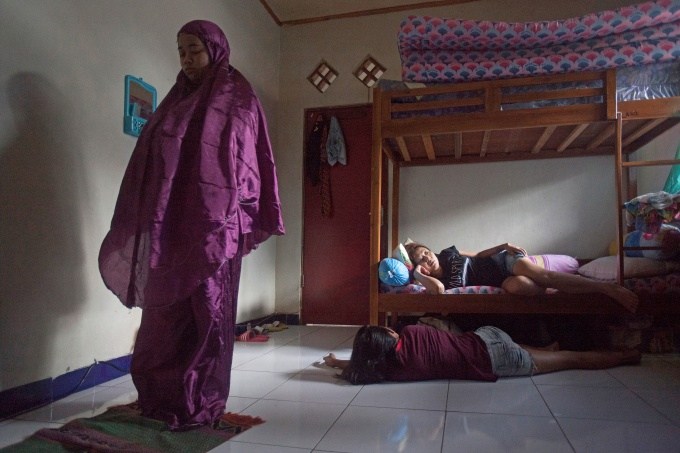
In 2005, Merry Christina and her boyfriend were arrested while injecting heroin in the backstreets of a South Jakarta slum. Over the following four days, Christina was drugged, blindfolded, and gang-raped repeatedly by police officers, while her boyfriend was beaten and tortured in a separate cell. To secure her freedom, the police demanded Rp 95 million ($7,500)—a bribe equivalent to four years of her salary.
Disturbingly, Christina’s ordeals are not unique. According to the Ministry of Health, Indonesia is home to an estimated 74,000 people who inject drugs [PDF], about 11 percent of whom are women. Women who inject drugs suffer the social repercussions of drug use and dependence differently than men, often with worse outcomes.
Those are among the findings of Perempuan Bersuara (Women Speak Out), a research project coordinated by the Indonesian Network of People Who Use Drugs and the University of Oxford. Christina and over 700 other women who inject drugs—from Jakarta, West Java, and Banten provinces—participated, making this the largest quantitative study of its kind in Indonesia. Their experiences of drug use, policing, violence, and health care are summarized in a new report, Women Speak Out: Understanding Women Who Inject Drugs in Indonesia [PDF].
Physiologically, women undergo a faster progression from drug use to dependence. They also face higher HIV, treatment dropout, and mortality rates. And because they are female, they suffer more stigma, discrimination, and abuse from their families and communities, who often perceive their drug use as immoral and incompatible with their expected roles as wives and mothers.
Our research found high rates of overdose, unsafe abortion, and unmet reproductive health needs. One especially concerning finding is the low uptake of treatment for HIV: 42 percent of women reported living with HIV, but less than half accessed lifesaving antiretroviral treatment. Poverty, punitive policing, and high unemployment exacerbate the marginalization of women who use drugs and hinder their access to health care and support services.
These vulnerabilities are magnified among women who do sex work. Nearly one-third of the women interviewed regularly traded sex for money or drugs, or to meet basic needs.
Especially alarming is the epidemic of violence shouldered by so many drug-involved women. Rape, physical abuse, and extortion at the hands of police officers are rampant, and constitute serious human rights violations. For many women, the abuse starts early in life, fueling a vicious cycle of trauma, substance use, and further violence. Four in ten of the women we talked to were victims of childhood sexual abuse, a factor linked to problematic drug use and mental health needs later in life.
In public health research, women who inject drugs are traditionally considered a “hard to reach” population—but our experience shows that they are only hard to reach when they want to be, due to fear of stigma or arrest. Perempuan Bersuara purposely sought to provide women who use drugs with a meaningful role in the design, implementation, and dissemination of a research project about them. Most members of our all-female research team are women use drugs, which created opportunities for personal development and deepened community ownership of the project.
Not surprisingly, it also had a profound impact on the quality of the research: women who were suspicious of health and social services came forward willingly when referred by trusted female peers, and spoke more openly about their lives. “I met groups in my own community that I didn’t even know existed and who have never been reached by health and support services,” said Mira Febriyanti, a member of the research team who started injecting heroin in 1997. “I feel proud that they are comfortable enough to share their experiences with me.”
Perempuan Bersuara recommends a set of urgent actions for Indonesia’s policymakers and service providers to better address the needs of women who inject drugs. These include establishing monitoring and reporting systems for police and intimate partner violence, providing legal aid to women who encounter law enforcement, and making existing HIV prevention and treatment services more accessible. On the heels of the research, the Indonesian Network of People Who Use Drugs is raising funds to develop an advocacy and community mobilization program led by and for women who use drugs.
“I chose to work on this study to help other women like me,” reflected Christina, who is now employed as an outreach worker at her local community health center and enrolled in a methadone maintenance therapy program to manage her drug use. “I was sad to hear how many of the women I interviewed had experienced the same things I had. My hope is that this work will change policy, and facilitate easier access to health services for women.”






